White Labeling has become increasingly popular due to the benefits it brings to merchants. It empowers retailers to expand their product offerings by selling a range of products manufactured by another party. Especially regarding white label digital products, they offer easier customization with lower overhead costs.
In this guide, we’ll explore the potential opportunities of selling white label digital products and a list of the most profitable digital products to consider in 2025. Let’s dive in and explore these opportunities.
Table of Contents
What are White Label Digital Products?
White label digital products refer to products in a digital format, created by one company and then sold or rebranded by another company under their own brand name. There are various digital products such as software, ebooks, online courses, and digital art.
Compared to physical products, it is much easier to customize branding elements like logos, color schemes, and features’ names. Thanks to these changes, the reselling company can make their digital products quite different from the original company, creating their business’s point of difference and building their unique brand in the market.
Pros and Cons of Selling White Label Digital Products
Each business model has its own unique advantages and disadvantages. Before deciding to start a white label business with digital products, you are advised to look at the pros and cons of this model.
Pros:
- Branding & Customization Flexibility: You can easily turn a digital product offered by another party into your own branded product with customization options for logos and features, allowing you to differentiate your offerings in the market.
- Time and Resource Saving: Because another party is responsible for developing, testing and maintaining digital products, you’ll save a lot of time and effort that should then be spent on branding, SEO, marketing, and sales.
- Lower Overhead Costs: Different from physical goods, digital products have minimal distribution costs, including shipping cost, warehousing cost, and logistics cost. As a result, retailers can earn more profits from white label digital products.
- Global Reach: You can build your own brand to market digital products globally. They can be sold and delivered to customers worldwide, without the constraints of physical logistics.
Cons:
- Lack of Exclusivity: As white label products are also sold to your competitors, you may face some challenges in differentiating your business in the digital market. You need to create marketing strategies to be successful.
- Dependence on Providers: It is difficult for you to gain full control over the product development process because the third party takes care of all, from quality to updates, and support. To avoid a risk of poor performance, you should regularly update with providers.
So who should resell white label digital products? In general, anyone can engage in white labeling, but the following types of businesses might best suit white labeling.
- Marketing Agencies: No need to invest time, money, and effort in developing products in-house while focusing on building brand awareness and communicating value to generate leads and drive sales.
- Web Design Agencies: Integrating white label digital products into their offerings helps diversify their services, enhance their portfolio, and provide added value for their clients.
- Digital Startups: When launching a startup with a low upfront budget, you can quickly set up a service offering with white label products. Along with it, you can develop your private-label product using the profits gained from white label products.
- Freelancers: Freelancers in digital marketing, graphic design, and content creation can leverage white label products to provide comprehensive services without the need to develop their own tools.
- Training Organizations: training institutions or course providers can customize the white label learning management system (LMS) software to manage and track the learning process under their brand.
10 Popular White Label Digital Products to Sell in 2025
1. SaaS products
Different from software installed on devices, SaaS (Software As A Service) refers to a cloud-based service where users register a monthly or annual subscription plan for access. SaaS providers offer customer support, regular updates, and maintenance to enhance the user experience.
If you choose to resell SaaS tools, you can customize the logo, colors, and interface to reflect your brand identity. For some SaaS products, developers include a white label feature so that users can replace their brands with theirs.
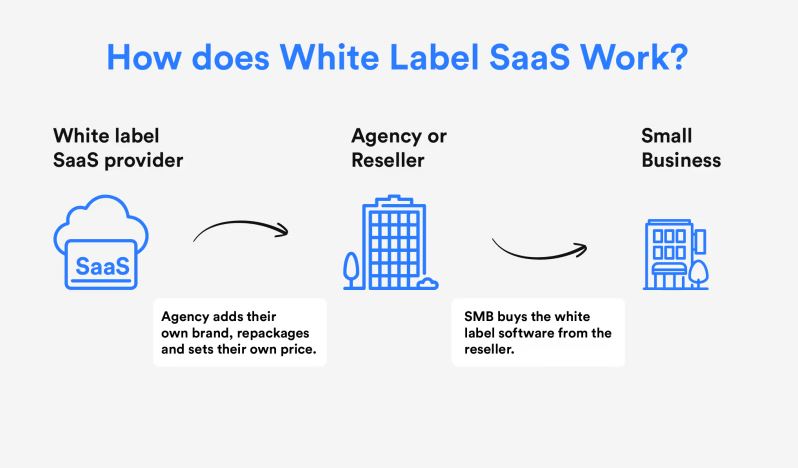
Examples of White Label SaaS Products:
- WordPress/Shopify Themes: WordPress themes like Woostify offer white label features. They allow removing branding elements and rebanding the theme as their own. While Shopify themes don’t provide many white label features, you can still replace the theme’s logo with their own brand logo.
- Email Marketing Platforms: Tools like Mailchimp, Hubspot, and Klaviyo offer white label solutions for businesses to run branded email campaigns. Using these tools, you provide customers with marketing services under your own brand.
- Page Builders: PageFly, Elementor or WooBuilder are page builders that empower you to build your website without coding, especially high-converting landing pages. You also can customize the brand’s logos, colors, and interface elements. If your current services include eCommerce solutions, you can create a bundle that incorporates this page builder.
- SEO tools: You get SEO tools from providers, extend SEO offerings, and rebrand them as your own by customizing the interface and report. You also can integrate them into digital service packages, including content creation and social media marketing. Semrush, SE Ranking, and Moz are some popular white label SEO tools you can consider while labeling.
- Social Media Management Tools: Platforms like Sendible, Hootsuite and Buffer allow agencies to manage multiple clients’ social media profiles from a single dashboard under their brand. These tools can integrate with other email marketing platforms and CRM systems.
- CRM Systems: HighLevel, HubSpot CRM, and Salesforce are the top CRM systems for white labeling. They offer powerful features and customization options. You can utilize the CRM software for different purposes such as marketing, business scalability, and sales automations.
- Project Management Tools: If you want to seek white label project management software to customize and rebrand, it is advisable to get Trello, Asana, Teamwork, or Monday. All of them provide agencies with robust features, real-time updates, and customization options.
2. Mobile Apps
There are multiple ways to make money with white label mobile apps. You can directly resell the original mobile apps to clients. If this is your choice, it is recommended to create a website to showcase the apps. Another option is to sell apps on online marketplaces like Flippa or Sell My App, or on app stores such as Google Play and the Apple App Store.
If your customers have different needs, you can customize apps with their branding. This approach allows you to create unique solutions without starting from scratch. White label mobile apps often don’t require many technical skills. Digital agencies or software companies can quickly generate revenue using this method.
White label mobile apps also help you gain ongoing monetization. You can demand recurring payments for maintenance and updates from clients. Pricing tiers will be set depending on support levels. Additionally, you can earn from additional features with the apps or charge clients a subscription fee to access certain features.
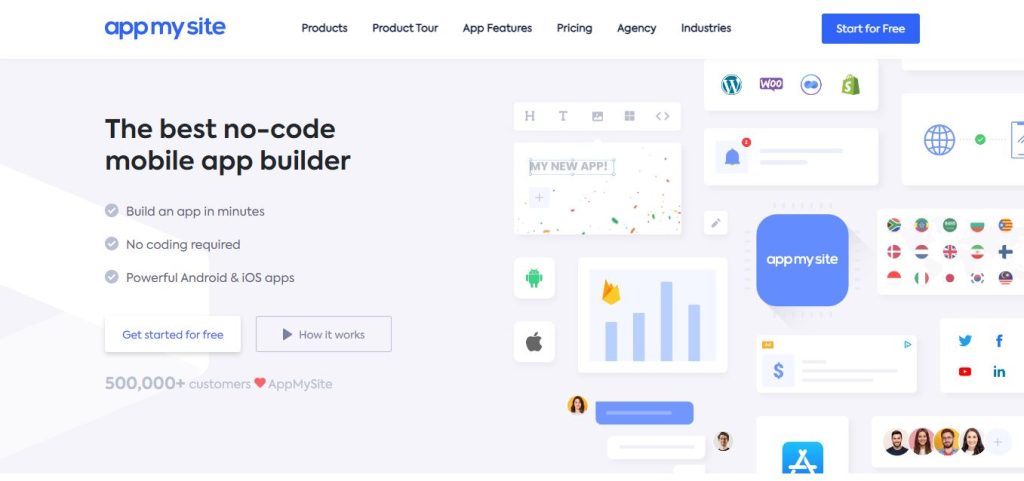
Best White Label Mobile App Builders:
- Appy Pie: Offers drag-and-drop interface, making it easy for non-technical users to build apps. Using APIs enhances mobile apps with third-party services like data storage, payment gateways or social media. Users can customize pre-built templates in App Pie to match their brands.
- BuildFire: Provides various customization options and features, including custom plugins,push notifications, and analytics tools. You can use this powerful, easy-to-use white label platform to create mobile apps for a range of industries.
- Bizness Apps: Specifically designed for small businesses to create custom mobile apps. The app builder offers customizable templates for different industries. Marketing and reporting tools and built-in monetization options create effective mobile apps that cater to target industry and market.
- App My Site: Helps expand your services and generate revenue with white label apps that are compatible with both Android and iOS. With App My Site, businesses can create shopping apps, transform their blog content into app format, or offer booking functionalities through apps.
- Mighty Pro: Becomes outstanding with customizable design, content management capabilities, built-in analytics tools, and community engagement tools. This is an ideal option for building event management apps, membership apps, and eCommerce apps.
3. Graphic Design Templates
You can find graphic design templates with white label features on various online marketplaces and platforms. These customizable templates allow changing logos and colors to fit your brand identity. Because they are almost designed for non-designers, you can easily customize designs to fit specific target niches and purposes of use.
Graphic design templates have a wide range of applications, including:
- social media posts
- email newsletters
- web banners
- infographics
- flyers and brochures
- business cards
- presentations
- labels and stickers
Freelancers can customize white label templates and resell them to customers. Meanwhile, marketing agencies and small businesses often use them as promotional materials for their products.

Best platforms to collect white label graphic design templates:
Below are popular platforms where you can access a library of graphic design templates for various design needs. Almost all of them are available for white labeling and customization.
4. Ebooks
Digital books or ebooks are also an ideal option for businesses to white label. With white label ebooks, you can buy, add your branding elements, and resell them as your own.
Many people might worry about licensing and rights when purchasing ebooks. However, white label book providers allow buyers to modify the ebooks’ content and distribute them as their own by selling on your own website or using third-party marketplaces such as Amazon and Etsy.
Besides, agencies can offer these ebooks as a tool for generating leads or bonuses for other products without crediting the original author. In general, you can utilize white label ebooks for different purposes while spending minimal effort and investment.
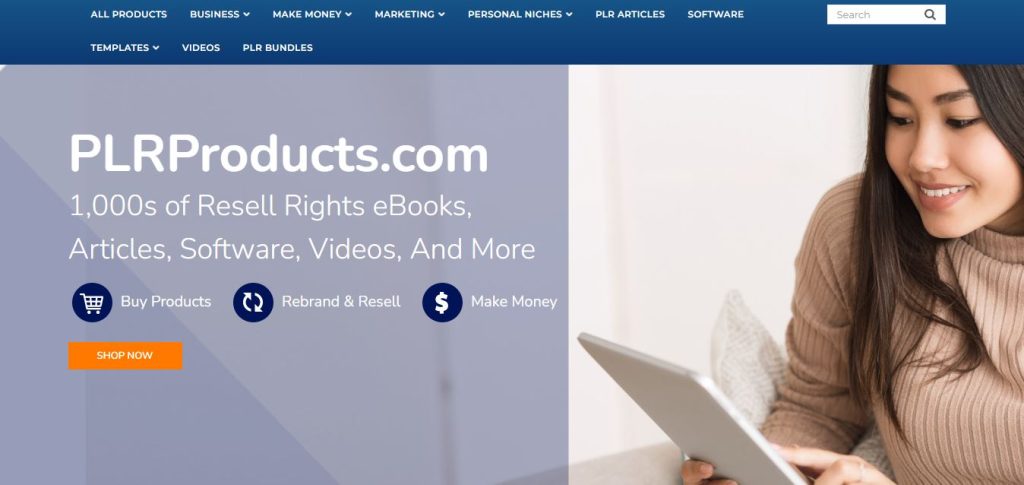
Best sources to find white label ebooks:
5. Online Courses
Online courses come in a variety of formats, from video lectures, written materials to quizzes, and interactive elements. For educational content delivery, quite a few businesses choose to resell white label online courses because they offer numerous customization options. With white label courses, you can customize branding elements and edit the course materials to make them match their brand identity and meet the audience’s needs.
Coaching and consultant companies can include white label online courses in their services to provide more value to customers or leverage these customizable courses to develop their training programs.

Best white label online course platforms:
There are a lot of user-friendly platforms offering online courses with white label features, including:
- Teachable
- Thinkific
- Kajabi
- LearnDash
- Podia
- Udemy for Business
- Skillshare for Teams
- Ruzuku
- LearnWorlds
- Academy of Mine
6. Educational Games for Children
White label educational games for children offer a branded, interactive approach to learning that appeals to young learners. Covering subjects like math, reading, and science, these games help children develop essential skills in an engaging, gamified format. Ideal for schools, tutoring services, and educational businesses, these white label games provide a customizable solution, allowing educators to adjust themes, characters, and branding to align with their identity.
These platforms also include progress tracking and adaptive learning features, enabling teachers to monitor student growth and adjust content based on learning levels. By offering a tailored learning experience, white label educational games add value to any educational provider’s offerings, enhancing both engagement and knowledge retention.

Popular White Label Educational Games for Children Providers:
- ABCmouse: Offers a wide range of educational games covering early childhood subjects, allowing schools or educational providers to rebrand and tailor content for interactive, engaging learning experiences for young children.
- Tynker: Provides coding-based games that introduce children to programming concepts. It allows full customization, making it ideal for organizations wanting to teach tech skills with their own branded approach.
- Osmo: Combines physical and digital elements for an interactive learning experience. Ideal for early education, it offers white label options for schools to deliver customized, hands-on learning activities.
7. White Label Learning Management Systems (LMS)
White label Learning Management Systems (LMS) are platforms that enable organizations to deliver branded, scalable educational content, manage courses, and track learner progress. These systems are widely used in corporate training, higher education, and professional development, providing tools for multimedia content delivery, assessments, and reporting.
White label LMS solutions allow organizations to customize the interface and design, integrating their logos and brand colors for a cohesive learning experience. They also offer seamless integration with CRM and analytics tools, making them ideal for companies, educational institutions, and training providers looking to offer a consistent, branded learning environment.
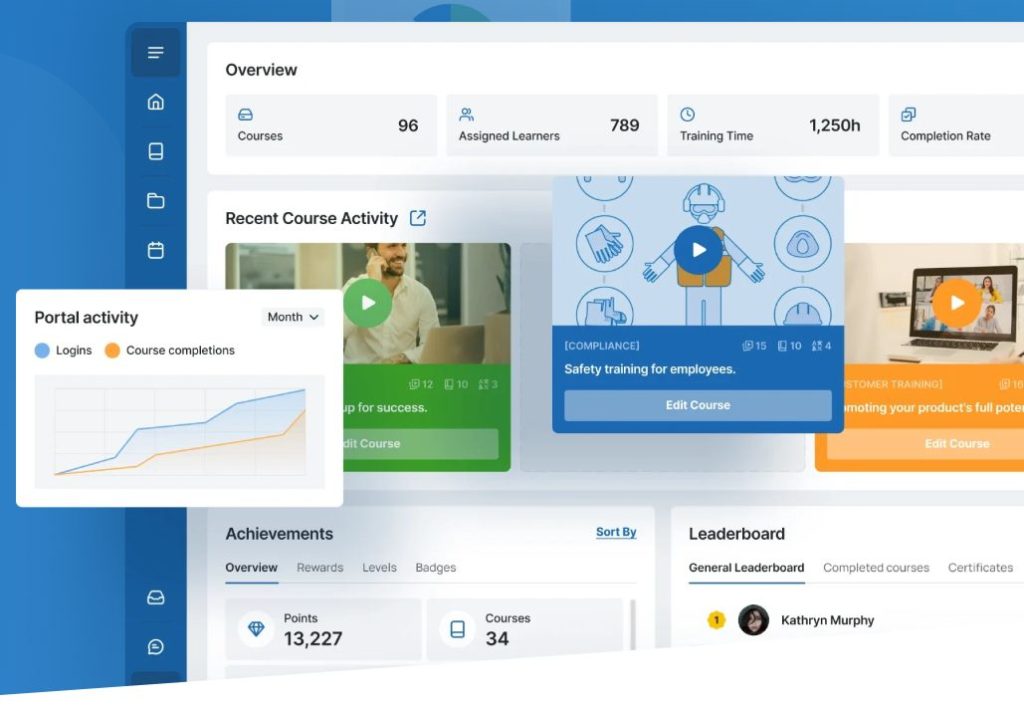
Top White Label Learning Management Systems Providers:
- TalentLMS: A highly adaptable LMS, TalentLMS is suited for various educational and corporate training needs, offering complete customization of branding, interface, and features to align with specific learning goals.
- Learnupon: LearnUpon provides a scalable LMS solution tailored to professional training, allowing businesses to manage branded training programs, assessments, and learner progress seamlessly in a customized environment.
- Docebo: This robust LMS offers extensive customization options, making it suitable for enterprises and educational institutions looking to provide personalized, branded learning experiences with advanced analytics and multimedia content.
8. Cloud Storage Management Solutions
As digital data continues to grow exponentially, businesses and individuals need secure and reliable cloud storage solutions. White label cloud storage management platforms enable companies to offer their own branded data storage services to customers, with features such as file sharing, data backups, and collaboration tools. These platforms are essential for businesses that handle large amounts of data or need to provide secure, accessible storage options to their clients.
By using a white label cloud storage platform, businesses can offer secure, customized cloud storage services without having to build their own infrastructure. These platforms often come with user-friendly interfaces, high-level security, and integration capabilities, allowing businesses to create a cohesive and branded digital storage solution for their customers.

Top White Label Cloud Storage Providers:
- pCloud: Offers secure cloud storage solutions with customizable branding options, allowing businesses to provide data storage services with their own logo, domain, and interface.
- Nextcloud: A flexible, open-source platform that allows businesses to create white label cloud storage systems, with robust security and file management features.
- OwnCloud: Specializes in secure file storage and sharing, providing white label solutions that businesses can rebrand to offer their own cloud services to customers.
9. Membership and Webinar Platforms
Membership and webinar platforms have become essential tools for businesses, educators, and content creators who want to build and engage their audiences. White label membership platforms allow businesses to create exclusive, branded communities, offering paid memberships, premium content, and interactive features such as discussion forums. Webinar platforms, on the other hand, enable businesses to host live events, workshops, and training sessions, all under their own branding.
By using white label membership and webinar platforms, companies can foster stronger relationships with their audiences and generate recurring revenue through subscriptions. These platforms are ideal for businesses offering online courses, coaching, live events, or exclusive content, as they provide complete control over branding and customer experience.
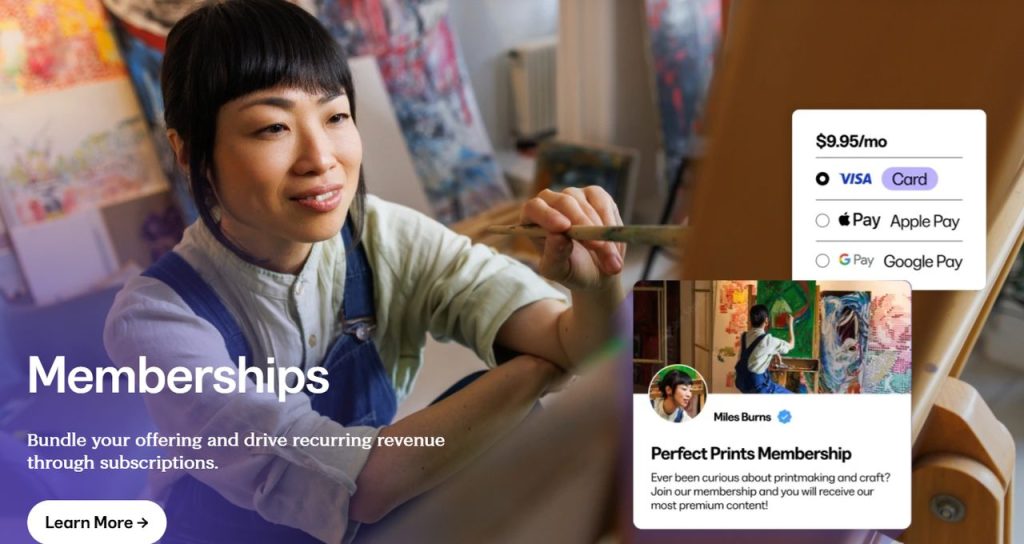
Popular White Label Membership and Webinar Platforms:
- Mightynetworks: A white label platform for creating branded membership sites and online communities, offering features like content sharing, live streaming, and paid memberships.
- Demio: A white label webinar platform designed for businesses looking to host branded virtual events, product launches, and training sessions with custom landing pages and attendee tracking.
- Kajabi: A comprehensive platform that allows businesses to create membership sites, offer online courses, and host webinars, all under their own brand with full customization options.
10. Fitness Digital Products
The fitness industry has seen rapid growth in the digital space, with increasing demand for online workout programs, meal planning tools, and fitness coaching apps. White label fitness digital products allow businesses, gyms, and personal trainers to offer custom-branded fitness solutions, including workout apps, nutrition guides, and wellness programs. These products are perfect for fitness influencers, personal trainers, or wellness brands looking to expand their services online.
White label fitness products often include features such as workout tracking, progress charts, personalized coaching, and meal plans, allowing businesses to create a complete digital fitness experience for their clients. Whether you’re offering a subscription-based fitness app or digital fitness guides, white labeling allows you to build a professional, branded platform quickly and efficiently.
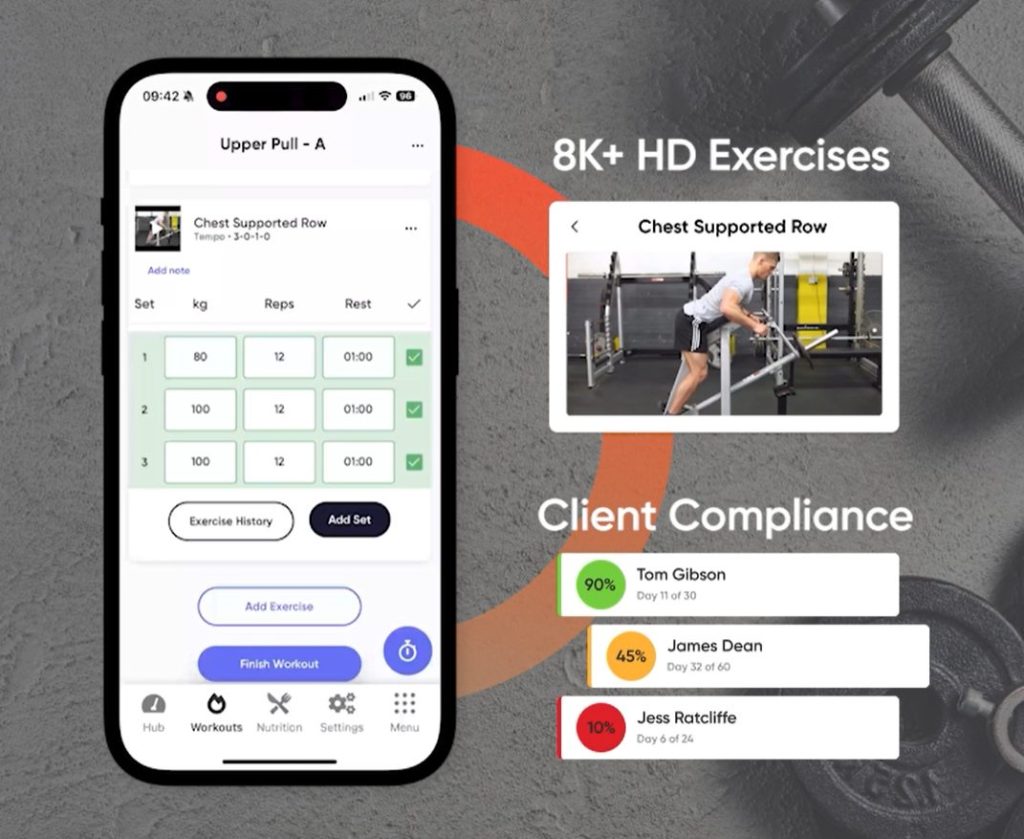
Best White Label Fitness Digital Product Providers:
- Trainerize: Provides a white label fitness app that enables personal trainers and gyms to offer branded workout plans, progress tracking, and virtual coaching services to their clients.
- My PT Hub: Offers a customizable white label platform for fitness professionals, allowing them to create personalized fitness programs, track client progress, and offer branded digital coaching services.
- FitApp: Specializes in white label fitness apps for gyms, trainers, and wellness businesses, offering features like workout logging, nutrition tracking, and branded interfaces.
BONUS: How to Find the Best White Label Digital Products to Sell
There are several ways and sources for you to find white label digital products.
- Online Marketplaces: You can explore white label themes, plugins, and templates on popular marketplaces such as ThemeForest, CodeCanyon, and Creative Market. You can refer to the top free premium Shopify themes that also introduce the best themes for selling digital products.
- Software Directories: Capterra, G2, and Software Advice are the top sources to seek reviews for white label eCommerce solutions of different categories.
- Forums & Social Media Groups: You can join forums for online businesses like Warrior Forum, Digital Point, and Black Hat World to find discussions about white label products and services. Besides, there are e-commerce, digital marketing, and startup groups on Facebook, LinkedIn, and Reddit where you can explore white label resources.
- Reaching out to Developers: Another option is you directly contact digital service providers to ask if they offer white label options.
- Competitor Research: It is recommended that you learn from your competitors. Please list competitors in your niche and check what white label digital products they are using or offering.
- White Label Product Sites: You’ll find numerous white label ebooks, courses, and printables on platforms like PLR.me, BIG PRODUCT STORE, Content Sparks, Tools For Motivation, and PLR Printables Store.
It’s Time to Select the Most Profitable White Label Digital Products!
In some cases, white labeling offers numerous advantages over private labeling. This article aims to help you understand the advantages and disadvantages of selling white label digital products, allowing you to determine if this business model is a good fit for you. What’s more, we introduce you to ideal products for white labeling and different methods to find them.
The next step is to select a platform to showcase and promote these products. You can refer to The Battle of E-Commerce Platforms: ClickFunnels vs Shopify to explore the two popular options.

